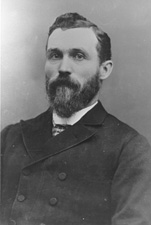William J. McConnell
| William McConnell | |
|---|---|
 |
|
|
United States Senator from Idaho |
|
|
In office December 18, 1890 – March 4, 1891 |
|
| Preceded by | (none) |
| Succeeded by | Fred Dubois |
| 3rd Governor of Idaho | |
|
In office January 2, 1893 – January 4, 1897 |
|
| Lieutenant |
F. B. Willis F. J. Mills |
| Preceded by | N. B. Willey |
| Succeeded by | Frank Steunenberg |
| Personal details | |
| Born |
William John McConnell September 18, 1839 Commerce, Michigan |
| Died | March 30, 1925 (aged 85) Moscow, Idaho |
| Resting place | Moscow Cemetery Moscow, Idaho |
| Political party | Republican |
| Spouse(s) | Louisa Brown McConnell (1846–1930) (m. 186x–1925, his death) |
| Children | 2 sons, 3 daughters |
| Parents | James McConnell (1793–1880) Nancy Coulter McConnell (1802–1859) |
| Residence | Moscow, Idaho |
| Profession | Agriculture, Mining |
| Religion | Presbyterian |
William John McConnell (September 18, 1839 – March 30, 1925) was the third Governor of Idaho from 1893 until 1897. He had previously represented the new state as one of its first United States Senators; Idaho achieved statehood in July 1890.
Born in Michigan and educated in its public schools, McConnell headed west as a freight wagon driver and ended up in California. There, he found work where he could get it: miner, store clerk, cowboy, and teacher. In 1862, he moved to Oregon, where he taught school, and then followed the gold rush into the Idaho Territory the following year.
Perhaps based on his earlier experience in California, McConnell spotted opportunity on the way to the gold fields around Idaho City. Rather than joining the throngs of prospectors, he and two other men claimed some good farmland near Horseshoe Bend. He and the others dug the first significant irrigation ditch along the Payette River and began raising vegetables. The following year, McConnell led a pack train loaded with produce over the mountains to Placerville and sold them at "fabulous" prices.
At the time, Idaho Territory was about a year old and law enforcement was scant to non-existent. When he and other settlers along the Payette began to lose horses and mules to thieves, the youthful McConnell took the lead in organizing a Vigilance committee for the region. While it did not end crime in the area, the work of the committee did reduce it and, according to the Illustrated History, "The farmers had no further trouble with horse thieves." McConnell later published a history of the period, which included a lengthy account of the vigilantes' work. He offered no apologies and asked for no forgiveness … but simply described what he saw as the necessity for what was done. Although, or perhaps because, McConnell was the recognized leader of the vigilantes, in 1865 he was appointed a Deputy U.S. Marshal for Idaho Territory. At the end of his two-year term, he returned to California.
...
Wikipedia
